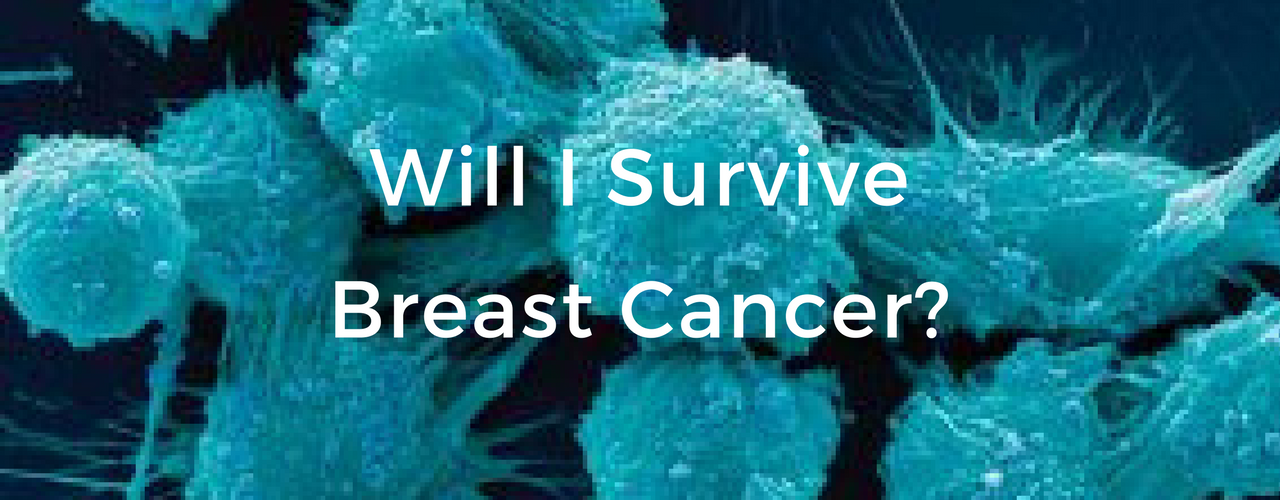Questions for your Breast Cancer Specialists:
- Am I going to die of breast cancer?
- What is the percentage chance I could die in the next 5 years?
- Do factors like “triple negative receptors” or “HER2-positive receptors” or “my youth” make my chance of dying higher than the average statistics?
Will I die of breast cancer?
This is a difficult question to answer early in your cancer care but it is still worth asking. Many people just diagnosed with cancer have no idea how much of a risk to their life their unique situation poses. Most breast cancers carry a low risk of recurrence, especially early stage cancers. The answer is usually reassuring.
What is the chance I could die in the next 5 years?
The average 5-year survival rate for all people with breast cancer is 89%. The 10-year rate is 83%; and the 15-year rate is 78%. If the cancer is located only in the breast (Stage I), the 5-year survival rate is 99%. More than 70% of breast cancers are diagnosed at an Early Stage.
All survival statistics are primarily based on the stage of breast cancer when diagnosed. Some of the other important factors are also listed below that affect survival.
Breast Cancer Stage is important.
Stage 0 breast cancer can be also described as a “pre-cancer.” If you have DCIS (Ductal Carcinoma In-situ) you can be quite confident you will do well. DCIS does not spread to other organs. What can be concerning is when an invasive cancer grows back in the area of a prior lumpectomy for DCIS. This type of local recurrence does carry a risk to your life. Luckily, this does not happen frequently. Also, be aware that those who have had DCIS in the past are at a higher risk for developing an entirely new, invasive breast cancer. Take our video lesson on “Non-Invasive DCIS“ (here) to learn more.
Early Stage “Invasive breast cancer“
Stage I invasive breast cancer has an excellent survival rate. The chance of dying of Stage I breast cancer within five years of diagnosis is 1 to 5% if you pursue recommended treatments.
Stage II breast cancer is also considered an early stage breast cancer. There is a slightly increased risk to your life versus a Stage I breast cancer. Altogether, the risk of Stage II breast cancer threatening your life in the next 5 years is about 15%.
Late Stage breast cancer (more advanced cancer)
Stage III breast cancer has a higher risk to your life, with a 72% survival at 5 years. There are many individual and tumor specific factors that can change this survival rate.
Inflammatory breast cancer is a more worrisome Stage III breast cancer. Overall, the 5-year survival rate for inflammatory breast cancer is about 50%.
Stage IV breast cancer means that the cancer has spread beyond the breast to other organs or parts of the body. These metastases are not viewed in general to be curable. The treatment is aimed at helping people live longer with their cancer. This is the type of cancer carries up to 75 to 80% risk of dying within five years.
What tumor factors threaten my life more?
There are important “tumor biology” factors not well reflected in survival statistics by breast cancer “stage.” Below we list a few important factors that carry a higher risk to life beyond just the stage of cancer. You must ask your surgeon or medical oncologist to explain your receptor status and give you a copy of your biopsy pathology report.
“Triple Negative Receptor” breast cancer
Triple negative breast cancer is considered a more aggressive breast cancer. Invariably it does require chemotherapy. If you have a triple negative breast cancer the risk of dying is higher than the standard statistics usually quoted for a particular stage of breast cancer (Stage I – IV). Learn more about “Triple Negative Breast Cancer“ with our video lesson (here)
“HER2-Positive” breast cancer
HER2-positive breast cancers are also more aggressive tumors. But the good news is that we now have incredibly effective, targeted chemotherapy and immunotherapy for HER2-positive cancers. Our video lesson covers “HER2-Positive Breast Cancer“ in more detail (here).
Breast Cancer at a Young Age
Women younger than 40 have a higher chance of being diagnosed with a more advanced stage breast cancer. Also, the specific cancer type younger women develop has a higher chance of being more aggressive (example: estrogen receptor negative, triple negative, HER2-positive). As a result, age is a relative risk factor for survival.
Untreated breast cancer
Untreated breast cancer obviously carries a higher risk of death than those who undergoing treatment. All survival statistics are based on breast cancer that underwent recommended treatment such as surgery, endocrine therapy, chemotherapy and radiation therapy. If you elect to not undergo standard treatment options, your chance of survival will be lower than the standard statistics for survival by stage.
Patient-Friendly References:
This link (here) has great information and defines terms such as “5-year survival rate.” It also lists survival rates based on Stage of breast cancer. The American Cancer Society is an organization that supports patients with cancer and funds research for cancer of all types.
Statistics for breast cancer survival are described in this link (here). The Susan G. Komen organization is a leading advocacy group dedicated to assisting patients, funding research and ensuring quality breast cancer care.
This video (here) describes the general survival rates for breast cancer. It also mentions the differences in survival for African American women and Caucasian women. The National Cancer Institute is a governmental agency that is dedicated to distributing information to the public about cancer and cancer research trials.
More Detailed References:
If you want to get deep into the details, this free 200-page pdf document has guidelines to help clinicians make treatment recommendations about nearly all aspects of breast cancer. You can easily register (here) as a non-professional to get access.



